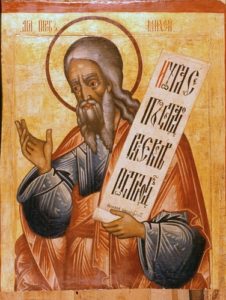Today’s text is one of the most remarkable in Hebrew sacred literature, made all the more remarkable for having been composed during a period of social and political turmoil and war not unlike our own. Did Micah actually foresee the events about which he writes; or did he interpret events he had experienced?
In some ways the text is more astonishing when we assume the latter. Zion has been plowed as a field; Jerusalem has become heaps. Micah tells us why. Would it not be easy at this point for Micah to find fault with the nations? Should he not fault foreigners, unbelievers, or those who follow a different god? Listen to what Micah says:
Hear this, I pray you, ye heads of the house of Jacob, and princes of the house of Israel, that abhor judgment, and pervert all equity. They build up Zion with blood, and Jerusalem with iniquity. The heads thereof judge for reward, and the priests thereof teach for hire, and the prophets thereof divine for money: yet will they lean upon the LORD, and say, Is not the LORD among us? none evil can come upon us. Therefore shall Zion for your sake be plowed as a field, and Jerusalem shall become heaps, and the mountain of the house as the high places of the forest. But in the last days it shall come to pass, that the mountain of the house of the LORD shall be established in the top of the mountains, and it shall be exalted above the hills; and people shall flow unto it. And many nations shall come, and say, Come, and let us go up to the mountain of the LORD, and to the house of the God of Jacob; and he will teach us of his ways, and we will walk in his paths: for the law shall go forth of Zion, and the word of the LORD from Jerusalem. And he shall judge among many people, and rebuke strong nations afar off; and they shall beat their swords into plowshares, and their spears into pruninghooks: nation shall not lift up a sword against nation, neither shall they learn war any more. But they shall sit every man under his vine and under his fig tree; and none shall make them afraid: for the mouth of the LORD of hosts hath spoken it. For all people will walk every one in the name of his god, and we will walk in the name of the LORD our God for ever and ever.
First Micah faults “the heads of the house of Jacob . . . princes of the house of Israel.” Why? Because they “abhor judgment, and pervert all equity.” How? Micah tells us that they openly expect and demand payment in exchange for their judgments. They are, he writes, “priests . . . for hire” who “divine for money.” When the actions and mission of the community of faith are governed by money, it is inevitable that these actions and mission will be perverse.
And, yet, Micah does not for this reason despair. Rather, he foresees a day when the surrounding nations – the peoples – will display faith greater than those who today occupy Jerusalem. “Many nations shall come, and say, Come, and let us go up to the mountain of the LORD, and to the house of the God of Jacob.” Followed by some of the most mesmerizing prose in all of sacred literature. Jerusalem has been leveled or is about to be leveled (it doesn’t matter). But instead of condemning the nations, Micah instead credits God’s judgment with turning the nations to peace. The LORD “shall judge among people, and rebuke strong nations afar off; and they shall beat their swords into plowshares, and their spears into pruninghooks: nation shall not lift up a sword against nation, neither shall they learn war any more. But they shall sit every man under his vine and under his fig tree; and none shall make them afraid.”
In times when fear seems to govern the actions of all, when everyone appears to be taking up their spears and learning war, Micah reports that God is not with them. This is astonishing. It is astonishing if Micah was only foreseeing the destruction of Jerusalem. But it is even more astonishing if Micah is publishing his message after Jerusalem’s destruction, when we might anticipate instead that he would be screaming words of hatred, war, and revenge.
And, yet, the most amazing is still to come. Is it because God has converted the surrounding nations? Yes, in a manner of speaking. And, yet, amazingly enough, they are still walking in the names of their own gods. “For all people will walk every one in the name of his god, and we will walk in the name of the LORD our God for ever and ever.”
In other words, it was not our different faiths or different gods that brought on this calamity. Neither does peace require that we all walk in the name of the same gods. To the contrary. Peace will come when we all embrace justice and all uphold equity.

